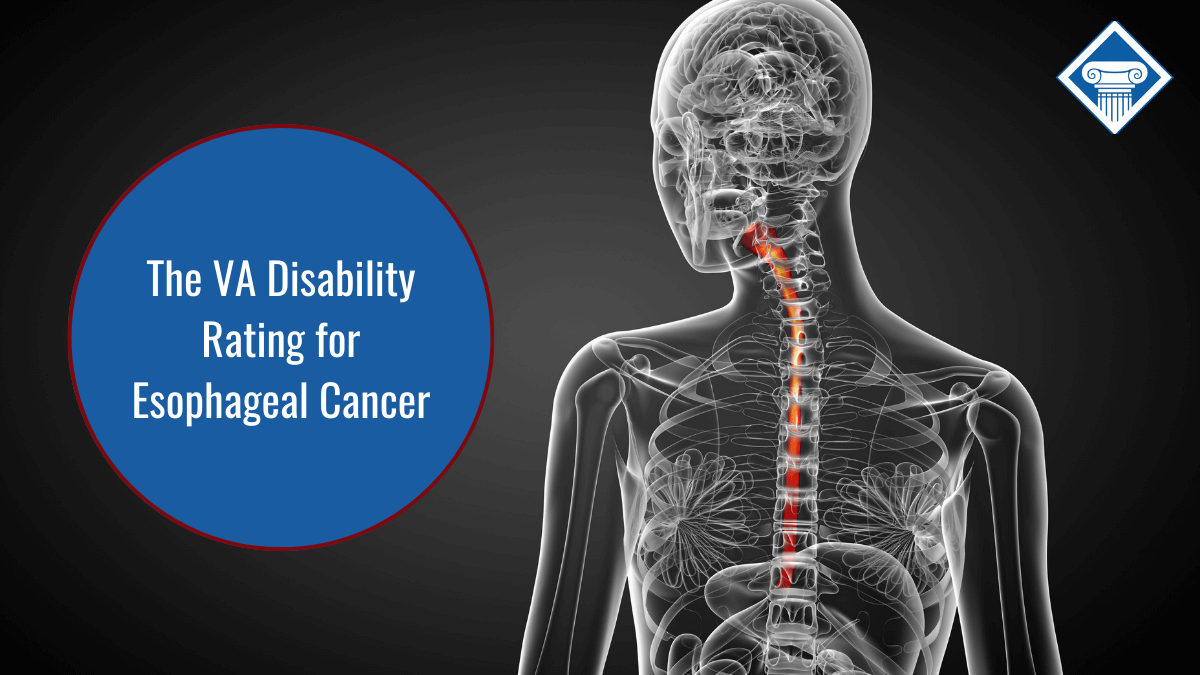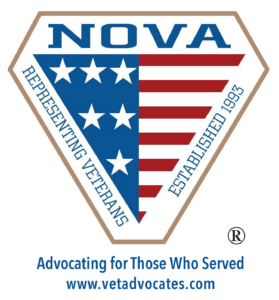Esophageal cancer is a serious and potentially fatal condition. If you are a veteran with esophageal cancer, you might be eligible for VA disability benefits. This post explains the VA disability rating for esophageal cancer.
Ready to get started?

You didn’t think about what you were burning. Maybe you didn’t even know what was in the burn pit or weren’t responsible for lighting or tending it. But now you have esophageal cancer, and you think it’s related to the toxins you breathed during your military service. Veterans are at an increased risk of esophageal cancer for various reasons related to their service. Understanding the causes of the cancer and the VA disability rating for esophageal cancer can help you better understand what benefits you may be entitled to.
In this article about VA disability for esophageal cancer:
Esophageal cancer in veterans
Esophageal cancer is cancer of the tube that runs from the throat to the stomach. People with this form of cancer usually experience difficulty swallowing and pain, pressure, or burning in their throat and chest. However, this cancer is slow growing, which means a person usually has a large tumor by the time they experience symptoms.
Veterans may be at greater risk for esophageal cancer, which requires surgery to remove the cancer and chemotherapy or radiation if it’s treatable. This increased risk is the result of exposure to toxins during service. Reports of veterans with esophageal cancer increased 40% from the mid-90s to the early 2000s. If left untreated or discovered in advanced stages, esophageal cancer can result in death.
From the day we contacted [Woods & Woods], they made us feel so comfortable. They treated us like we mattered and we were not just clients but family.

L.B., a Navy veteran and wife in Florida
From a Google review for Woods & Woods
VA disability rating for esophageal cancer
If you are diagnosed with esophageal cancer that’s linked to your military service, you may be eligible for VA cancer benefits.
The VA assigns a 100% disability rating to disabled veterans with active, service-connected cancer. That rating is temporary while your cancer is active. A temporary total rating continues for six months following the end of any treatment.
Six months after treatment, the VA should schedule a compensation and pension (C&P) exam to determine a new rating for cancer in remission based on the severity of your residual conditions, if any exist. If the active service-connected cancer returns, a new temporary total rating is awarded.
Esophageal cancer is a presumptive condition
To receive VA disability benefits, you must prove your esophageal cancer was caused or exacerbated by service or the condition is secondary to another service-related disability. However, you do not need to prove this link if there is a presumptive service connection.
A presumptive service connection means the VA assumes the condition is related to the unique circumstances of certain veterans’ military service. Therefore, if you’re diagnosed with a presumptive condition and your service meets the criteria, you qualify for a service connection.
Esophageal cancer and burn pits
Burn pits are areas of open ground the military used to dispose of on-site waste. As these materials burned, they released toxins that affected service personnel in various ways, even long after their service.
Veterans stationed in Iraq, Afghanistan, and other qualifying areas are believed by the VA to have been exposed to burn pits. Throat cancer of any kind is considered a presumptive condition for veterans exposed to burn pits during their service.
Esophageal cancer and radiation
Esophageal cancer is also a presumptive condition for veterans exposed to ionizing radiation. These “atomic veterans” were exposed to ionizing radiation from waste, weapons, or equipment during their service. Their exposure to radioactive materials resulted in multiple serious health conditions including esophageal cancer, which the VA now considers presumptive.
If you’re uncertain about whether your disability or exposure to radiation qualifies you for a presumptive service connection, the full eligibility criteria can be found in our article on atomic veterans.

VA unemployability and cancer
A veteran can be awarded total disability based on individual unemployability (TDIU) for esophageal cancer that’s in remission if they still experience residual effects from their treatment.
Esophageal cancer can have long-lasting effects like pain and difficulty swallowing. Even after treatment ends, some people still experience side effects like tiredness or nausea. These symptoms can make attending a full-time job or spending much time speaking impossible. It also may make them unable to concentrate on tasks at work because of pain or lack of sleep.
Veterans may seek out TDIU if they can’t maintain “substantially gainful employment” due to their service-connected conditions.
TDIU pays at the same level as a 100% disability rating, even when the veteran’s combined rating is below 100%.
Veterans will typically be eligible for TDIU if they have:
- At least one service-connected disability rated at 60% or more disabling OR
- Two or more service-connected disabilities with at least one rated at 40% or more disabling and a combined rating of 70% or more
How our VA-accredited attorneys can help
If you have a service-connected condition that affects your ability to live and work comfortably, you deserve VA disability compensation. Contact Woods & Woods today for a free consultation to see how we can help. You only pay us if we win.

Our team is ready to help
Frequently asked questions
Yes, esophageal cancer does qualify for VA benefits, depending on the cause of the cancer and its connection to your military service. Esophageal cancer is a presumptive condition for qualifying veterans who were exposed to ionizing radiation and burn pits.
The VA assigns a 100% disability rating to veterans with active, service-connected cancer, including esophageal cancer. That rating is temporary while your cancer is active and for six months after treatment ends. The VA then re-evaluates the condition and assigns a new rating based on any residuals.





